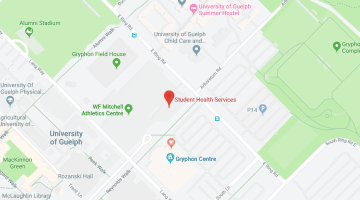Updated Aug. 31, 2022
Though Mpox is currently disproportionally impacting our queer communities, University of Guelph students are reminded to take proper public health measures and educate themselves on signs, symptoms, transmission, and vaccines as they return to life on campus. Read below to learn more.
What is Mpox?
How Mpox Spreads
Mpox can spread through any type of close contact with someone who has the virus. Sexual contact is just one of the ways it can spread.
Close contact can include:
- Skin-to-skin contact with lesions or open wounds
- Contact with bodily fluids (e.g. blood, saliva, semen)
- Contact with mucosal surfaces (eyes, nose, and mouth) during prolonged face-to-face contact
- Contaminated personal items (bedding, towels, clothing, cutlery, toothbrushes, sex toys)
Why are people calling it an STI?
Stigma! Thinking of Mpox as an STI that only affects gay men ignores that it can pass through all of the above ways between anyone. This stigma can lead to people not getting the healthcare they need to help stop the spread.
While Mpox is currently disproportionately affecting queer communities, it’s important that everyone is taking proper public health measures.
Mpox Symptoms
People usually develop symptoms 5 to 21 days after being exposed to the virus and typically last from 2 to 4 weeks. Symptoms include:
- A rash that could affect any part of the body (mouth, genitals, face, arms and legs, hands and feet)
- Fever
- Chills
- Swollen lymph nodes
- Headache
- Muscle pain
- Joint pain
- Back pain
- Exhaustion
The rash/lesions can be very painful and could leave permanent scarring.
What to do if you’ve been exposed or have symptoms
- If you think you have Mpox and have symptoms [1], self-isolate and contact a healthcare provider right away. University of Guelph students can contact Student Health Services to seek medical care at 519-824-4120 ext. 52131 → 3 → 1
- Case report and contact management is provided by WDG Public Health. If you have had contact with a known or suspected case of Mpox, contact WDG Public Health at 1-800-265-7293 ext. 7006.
If you’re diagnosed, make sure to isolate away from others. It’s important to follow your healthcare provider’s advice on how long they recommend you isolate.
While you’re isolating, follow public health measures to reduce the risk of spreading the virus to others in your house. This includes covering coughs and sneezes, washing your hands, and cleaning and disinfecting shared surfaces and objects. The Public Health Agency of Canada has additional details on what to do if you have a Mpox infection [2].
Preventing the Spread of Mpox
Following public health measures can reduce your risk of getting or spreading Mpox.
- Stay home when you’re feeling sick
- Cover coughs and sneezes
- Wash your hands regularly
- Clean and disinfect high-touch surfaces and objects
- Avoid skin-to-skin contact with people who have a rash that looks like Mpox
- Avoid contact with objects and materials that someone with Mpox has used
Mpox Vaccine
A vaccine is currently available for adults 18 years of age and older who are at high risk of contracting the virus. Imvamune® vaccine [3] is approved in Canada for protection against smallpox, Mpox and other orthopoxvirus-related illnesses. The vaccine contains a weakened virus and cannot make you sick.
Based on Ontario Ministry of Health guidelines [4], the vaccine is available for the following eligible groups:
For Pre-Exposure Prophylaxis (PrEP)
-
- Two-spirited, non-binary, transgender men and women or cis-gender individuals who self-identify or have sexual partners who self-identify as belonging to the gay, bisexual and other men who have sex with men (gbMSM) community AND at least one of the following:
- Diagnosed with a bacterial sexually transmitted infection (STI) in the past two months (e.g. chlamydia, gonorrhea, or syphilis);
- Recently had two or more sexual partners or may be planning to;
- Recently attended venues for sexual contact (e.g. bathhouses, sex clubs) or may be planning to, or who work/volunteer in these settings;
- Recently had anonymous/casual sex (e.g. using hook up apps) or may be planning to;
- A sexual contact of an individual who engages in sex work
- Anyone who engages in sex work or may be planning to.
- Household and/or sexual contacts of people who are eligible for PrEP – listed above in parts (a) or (b) – AND have a weak immune system or are pregnant. These individuals should contact a healthcare provider or Toronto Public Health for more information.
- Two-spirited, non-binary, transgender men and women or cis-gender individuals who self-identify or have sexual partners who self-identify as belonging to the gay, bisexual and other men who have sex with men (gbMSM) community AND at least one of the following:
For Post-Exposure Prophylaxis (PEP)
- People who have a known exposure/close contact with someone with Mpox can get the vaccine.
- When the vaccine is used as PEP, it should be given within four days, but can be given up to 14 days after the last exposure.
Vaccination clinics are offered through Wellington-Dufferin-Guelph Public Health [5] at the ARCH clinic on Tuesdays.
Eligible individuals can book an appointment by contacting WDGPH at 1-800-265-7293 x7006. Visit WDGPH’s website [5] for the most up-to-date information on pre-exposure vaccination clinics.
The vaccine is currently not available at Student Health Services [6].
